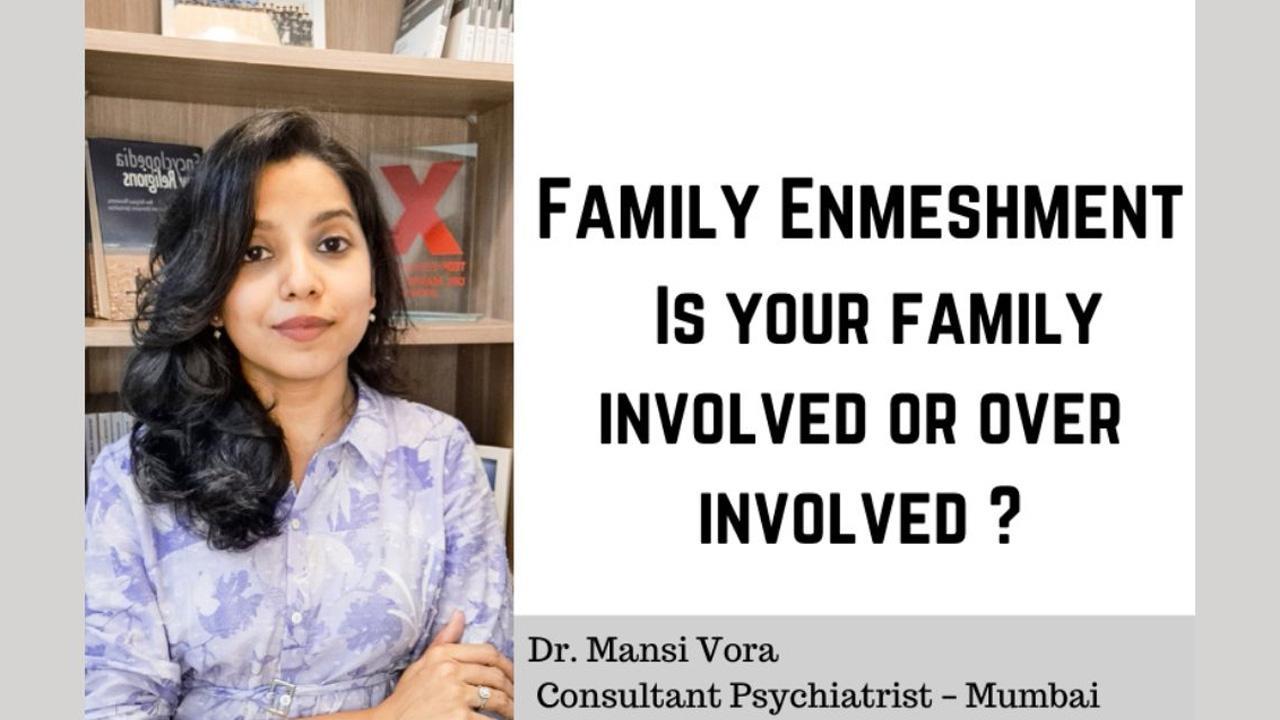Dr. Mansi Vora is a highly regarded psychiatrist known for her comprehensive and empathetic approach to mental health treatment. Here Dr Vora delves into the complex concept of family enmeshment, an often overlooked but prevalent issue that disrupts healthy familial relationships.

Dr. Vora's dedication to destigmatizing mental health and her professional expertise establish her as a leading figure in modern psychiatry
ADVERTISEMENT
A 47-year-old patient came to me for anxiety and depression following her son’s broken engagement. She felt ashamed due to the broken alliance. She tried her best to help the couple resolve their conflicts by knowing every detail about their relationship. She even told her son to give the relationship a chance for her sake, as she would be unable to deal with the questions posed by society. The son tried his best, inspite of his decreasing willingness, but eventually, the girl called off the engagement. On the outside, it may look like a concerned, caring, involved parent, but what it actually is – Enmeshment. An overinvolved parent.
While you may be hearing the term for the first time, this is not an uncommon occurrence. As a Doctor who is also spreading awareness on Instagram, I come across many DMs and patients having difficulty in familial relationships, in communication, and familial conflict resolution, mostly resulting from Enmeshment.
What is Enmeshment?
Enmeshment is when personal boundaries are unclear and permeable. Making it difficult for family members to develop a healthy level of competence, independence and autonomy. Enmeshment can be seen in a child-parent relationship, between siblings etc. Often involves a level of control where family members want to know and control the thoughts and feelings of the other family members. Often the family members rely too heavily on children or other family members for emotional support.
So what does Enmeshment look like?
For the sake of understanding, let's look at child–parent relationship. In enmeshed families, children are expected to adhere to the same belief system as their parents. There is also pressure on children to follow career paths laid out for them by their parents, strictly marry based on parental expectation and choice, and raise their children according to the grandparents’ belief system. Children from enmeshed families are forced to put the needs of the family before everything else. If the children do decide to pursue a life of their choice, they are made to feel guilty and ashamed for ‘overstepping their bounds’, may face familial estrangement, and may be financially cut off.
One may argue that it looks like closeness in the family.
Closeness vs Enmeshment
Closeness is marked by support and warmth for each other, without the expectation of sacrificing one’s identity for the sake of family. Closeness with healthy boundaries is called cohesiveness, where members of the family love together yet respect the need for a healthy amount of privacy and independence. Close families support each other unconditionally. They do not use closeness as a tool for control, unlike in enmeshed families.
Why is enmeshment a problem?
People from enmeshed families often struggle to take independent decisions, may have difficulty forming self-identity, and may avoid taking healthy risks.
In enmeshed families, any decision not aligning with parental expectations is considered betrayal and abandonment. They are often made to feel guilty if they don’t call enough or visit enough, unlike close families, where such members may receive some complaints but are not made to feel guilty. Enmeshed families also witness a lot of alliances within the family being formed, broken, and re-formed because members are expected to choose sides with every issue. Consequently, members from enmeshed families have difficulty forming healthy relationships even outside of the family setting.
How to deal with Enmeshment?
Taking the help of a Psychiatrist or Psychologist, who will help you set healthy boundaries, unlearn unhealthy habits, and build independence.
Dr. Mansi Vora (Consultant Psychiatrist – Mumbai)
MBBS, DPM, MRCPsych (London)
+91 9820 309 786
Instagram – dr.mansivora
https://www.instagram.com/dr.mansivora/
 Subscribe today by clicking the link and stay updated with the latest news!" Click here!
Subscribe today by clicking the link and stay updated with the latest news!" Click here!







